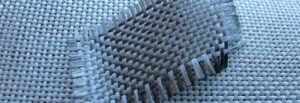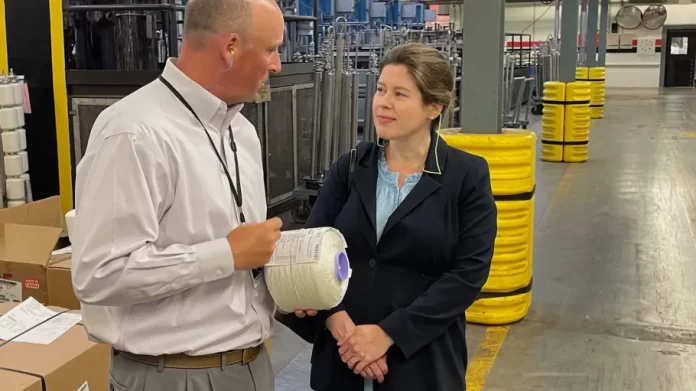“Strategic Textiles and Trade: Unraveling Impacts of Katherine White’s North Carolina Visit”**
Trade Talk in Textile Town: A Deep Dive on Katherine White’s Visit to North Carolina
Hello, lovely textile enthusiasts! Textile Topher here, bringing you the latest buzz in the world of textiles with a riveting story that has the fibers of the industry buzzing. This time, we dive into the heartfelt and high-stakes world of textile trade as Katherine “Katie” White, the newly minted chief textiles and apparel negotiator for the U.S. Trade Representative (USTR), recently made an inaugural visit to the textile heartland of North Carolina. The setting? A state that’s deeply interwoven with America’s rich textile legacy and its future.
Meet the New Negotiator
Katie White isn’t a newcomer to the intricate dance of trade policies; she previously brought her expertise as an International Trade Policy Advisor on the House Committee on Ways and Means. Her transition to the role of chief negotiator for the USTR places her at the forefront of shaping pivotal trade decisions that will influence both the domestic textile industry and, by extension, the global market.
During her visit, White toured six major textile plants including American & Efird, Parkdale Mills/U.S. Cotton, TSG Finishing, Shuford Yarns, Schneider Mills, and Unifi. She wasn’t just there to shake hands and pose for pictures. No, her mission was to gain firsthand insights into the advanced manufacturing capabilities that these behemoths embody and discuss the ways trade policies resonate through the intricate web of domestic and international supply chains.
North Carolina: The Textile Nexus
North Carolina is no ordinary destination for White’s initial foray as chief negotiator. The state stands as a testament to the prowess and resilience of the American textile industry. With a formidable legacy dating back centuries, today, the region is a powerhouse of innovation and quality production.
This southeastern state is vital not just because of its enormous manufacturing capacity but also due to its pivotal role in supplying critical equipment to the U.S. military, from uniforms to personal protective equipment (PPE). This relationship underscores the sector’s strategic importance beyond commercial revenue, highlighting its role in national security and public health.
Advanced Manufacturing: The Industry’s Future
During her visits, White was introduced to a stunning array of advanced manufacturing technologies. This is where technical textiles come into play—a term that may sound jargon-y but is essential to understand. Technical textiles refer to textile products manufactured not primarily for aesthetics, but for their technical performance and functional properties. These can range from geotextiles used in civil engineering to medical textiles like surgical gowns and implants. The versatility and innovation involved in their production make them integral to modern industry.

For example, Unifi—one of the companies White visited—is known globally for its recycled performance fibers. Unifi’s Repreve® is a perfect illustration, transforming plastic bottles into high-quality fibers used in everything from activewear to automotive interiors. This sustainable twist taps into the ever-growing demand for environmentally-conscious choices in the textile market.
Key Conversations: Enforcing Fair Trade
White’s visit was also underpinned by some meaty, substantive discussions. At Gaston College’s Textile Center, an industry roundtable painted a vivid picture of the acute challenges and bright opportunities within the sector. Executives stressed the need for robust trade policies to tackle “predatory practices” of foreign competitors, with China frequently in the crosshairs.
Here’s an insider term worth knowing: Section 301 tariffs. These are trade tools meant to combat unfair practices and can be particularly impactful in leveling the playing field against countries that engage in trading shenanigans. Executives urged White to ramp up these tariffs against Chinese textile imports.
Moreover, the conversation didn’t stop at tariffs. Issues like closing the de minimis loophole—which lets low-value imports bypass certain regulations—were hotly debated. Such loopholes can flood the market with imported goods, undermining domestic production.
Western Hemisphere Co-Production Chains and Yarn Forward Rules
Discussions also turned toward strengthening the Western Hemisphere’s co-production chain and maintaining the yarn-forward rule of origin. Now, let’s demystify these a bit.
Western Hemisphere Co-Production Chains: These are supply chains that involve multiple production stages across countries within the Western Hemisphere (e.g., the U.S., Mexico, Central, and South American countries). Such chains are crucial for leveraging regional strengths and producing competitive products.
Yarn Forward Rule of Origin: This is a stipulation in trade agreements that requires the yarn used in a textile product to originate in a member country for the goods to qualify for trade benefits. It’s a linchpin in safeguarding domestic yarn spinners and ensuring regional trade benefits stay within North America.
Ensuring Domestic Security and Employment
Executives were keen to emphasize the role of policies like Buy American and the Berry Amendment, which advocate for the use of domestically produced textiles, especially for government procurement. This issue isn’t just about economics—it’s about security. Ensuring that military equipment and essential public health supplies are produced domestically reduces dependence on foreign supply chains, fostering both national security and industrial resilience.
The Bigger Picture in Trade Policies
Further, White’s visit unpacked the crucial aspect of customs enforcement for both textiles and free trade agreements. Enhanced surveillance and stricter penalties for violations are vital in creating an environment where fair competition can thrive.
Kim Glas, president and CEO of NCTO, lauded White’s listening ear and proactive stance, highlighting the gravity of the moment. “Predatory trade practices employed by China and other countries are harming the domestic textile supply chain and our Western Hemisphere trade partners,” she said. “Our industry is calling for urgent action by our government to address them head-on.”
Voices from the Ground
White also had the opportunity to hear directly from the hardworking folks who form the backbone of this industry. This is no small matter; it’s about appreciating the human element behind those mind-bogglingly efficient machines and high-tech production lines.
She noted that the Biden administration, alongside USTR Ambassador Katherine Tai, is resolute in implementing trade policies that are not only competitive but also equitable for American industries and workers. This overarching aim is fundamental for the sector’s stability and growth.
Final Thoughts: A Momentous Beginning
White’s North Carolina visit lays the foundation for a more robust dialogue between policymakers and the textile industry. The converging issues of fair trade, advanced manufacturing capabilities, and sustainable practices form a tight-knit agenda that, if addressed effectively, promises to usher in a new era of prosperity and innovation for the industry.
As we look ahead, it’s crucial for us, the wider community of textile aficionados, industry stakeholders, and consumers, to stay engaged and informed. Textile policies may often seem like the domain of high-level negotiations and governmental decrees, but they echo through each thread of the industry, impacting the clothes we wear, the safety gear that protects our heroes, and the innovative fabrics that are shaping the technology of tomorrow.
Cheers to Katherine White and the USTR on this pivotal visit, hoping it’s the first of many steps towards securing and enhancing the future of textiles. Stay tuned, my fellow fabric fans, for more textured tales and insightful threads right here with Textile Topher!
That wraps up today’s deep dive! Stay woven into the tapestry of textile news and innovations with your friendly neighborhood Textile Topher. Until next time, keep those creative threads spinning!
Keywords: Textile Industry, North Carolina, Trade Policies, (Post number: 3), Sustainability, Advanced Manufacturing





